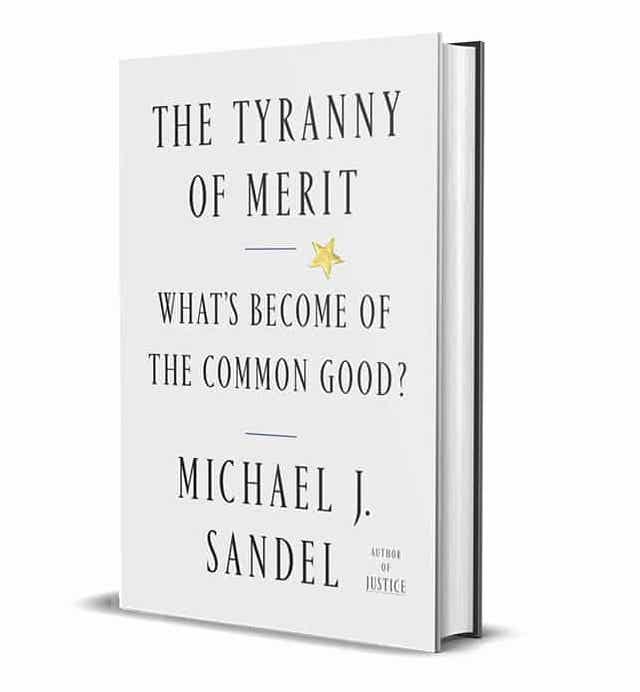
Meritocracy is a popular nonfiction topic these days, with Sandel’s book published on the heels of Markovits’ 2019’s “The Meritocracy Trap“. Indeed the backlash against so-called elitism gives us a lot to think about.
Reflecting on meritocracy in general (and technocracy in particular), I am reminded of Churchill’s remark that “democracy is the worst form of government – except for all the others that have been tried.”
Sandel outlines some really damning outcomes of the rise of meritocracy and the “rhetoric of rising” in the U.S. For me, foremost on the list is the rising fiscal inequality that benefits from our broad acceptance of meritocracy, and acquiescence to all its forms (e.g., across diverse domains). High academic achievement, he argues, has become a basis of meritocratic hubris. Having rooted itself in our schools and universities, this by-product of education has been cashed out as an all-encompassing ticket to wealth accumulation.
The singularly-American obsession with self-made wealth has fused with academic achievement. This has led to a broad deterioration of our mid-20th century, quasi-egalitarian social fabric – the weakening of our ability to communally value goods that exist apart from academic achievement. But what, we might ask, are those?
Academic achievement has become expansive in an interesting (if confounding) way. Reading, writing, and arithmetic have been foundational to public education for about 150 years. And one might add religion. But the study and practice of the visual arts, music, and athletics have all come under the umbrella of formal education as well, to say nothing of the social sciences and related humanities sub-disciplines. Colleges and universities have become all-encompassing amalgams of evaluation and accreditation. Almost anything humans celebrate as worth doing has been incorporated into the curriculum.
And so, education has become a proxy and a symbol for doing anything seriously. The obvious cause of this is that we are taking our activities seriously: discussing, researching, evaluating, and sharing our actions and beliefs in every domain we can. On the face of it, this seems like a wonderful trend. But Sandel and others have revealed the folly of this path: negative feedback loops. A resentful underclass. A self-assured-yet-neurotic elite. And growing inequality.
What kind of correctives can allow us to keep the benefits of comprehensive education but mitigate the negative outcomes?
As Sandel notes, the so-called liberal elite have promoted the solution of more education for half a century. Higher education for all. Lifelong training (and retraining). Career pathways. But he suggests this path has deepened political divisions by doubling-down on education without improving social and economic outcomes for most. The political and economic problems of the present therefore point us to wealth redistribution as a solution. Notably, the solution of taxing the rich and creating educational opportunities for the poor fits this model perfectly.
If increasing educational opportunities for all is a minimal approach, then the fantasy of a social state is the strong one. But the solution of taxing the rich so as to entirely remove economic inequality clearly collides with our collective “dream” of self-reliance, to say nothing of our collective fantasies about capitalism. This tension arguably forms one of the deepest divisions between “conservative” and “liberal” approaches to governance.
What else can be done? What about the possibilities for reengineering education itself?
There are many visions of education that do not reify the value of grades and ranked outcomes – those special distillations of education that are bound up in capitalist fantasies of competition and financial success. Can we build a new foundation of collaborative action? Can we be guided by vision of collective success and shared outcomes?
To do so would be to embark on a mission to simultaneously recreate constraints for capitalism that betray our shared values that led us to educational excellence in the first place: curiosity, discovery, and knowledge. To do so would be to exit the casino and join cooperative projects. This is happening all around us, of course – the future that’s here, but unequally distributed. If it’s happening both with and without education, how can we shine a stronger light on it? Can we trace it as a solution to our meritocratic ills?
To take this path is a leap of faith. Choosing collective outcomes over individual ones. This chafes with our current capitalist optimism. It presents us with an even greater reckoning:
Can we live under the tyranny of shared endeavors, but still experience freedom as the well-educated wealthy elite now ostensibly enjoy? How long will it take us to reimagine so-called freedom as such?